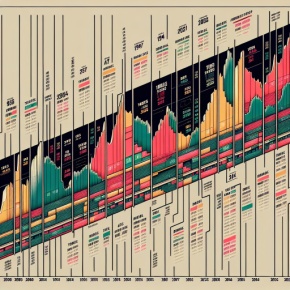By: Christopher Gannatti, CFA
Key Takeaways
- In 2025, a quantum chip solved a problem in minutes that would take a classical supercomputer longer than the age of the universe, signaling a seismic leap in computational power that investors must watch closely.
- While fusion breakthroughs and interstellar-scale data consumption reflect humanity’s soaring technological reach, they also expose deep contradictions in energy use and value creation.
- From plastic layers forming a new planetary stratum to avocados causing earthquakes, the unintended consequences of progress are reshaping both markets and the Earth itself, underscoring the need for resilient, forward-looking investment strategies.
We often talk about the future as if it’s something we’re waiting for. But the most astonishing thing about the future is how much of it has already arrived—and how quietly it did so.
Some revolutions don’t shout. They slip past our attention, one headline at a time, until we wake up and realize we’re not in the same world anymore.
To see this clearly, you don’t need predictions. You need perception. You need to know what’s already true—right now. And sometimes the truth comes in the form of a number so staggering it fractures your sense of scale.
Here are 20 of those truths. Not as trivia, but as proof: the present is already stranger than we expected the future to be. These come from a bigger piece containing 150 such facts. The lead author of the piece was featured on this episode of our Behind the Markets podcast1.
The Compression of Time and Space
We tend to think in centuries, but technology moves in moments.
In 2025, a quantum chip built by Google solved a problem in under five minutes that would take the world’s most powerful supercomputer 10 septillion years to complete. That’s longer than the universe has existed. What used to be unfathomable is now executable—on a chip.
Meanwhile, since 2006, humans have collectively flown more than 95 trillion kilometers—roughly 10 light years. We’ve been to Proxima Centauri and back, not as astronauts, but as passengers. You don’t need warp drive for space travel. Just commercial airliners and enough time.
And while we crossed those distances, the tools in our pockets became godlike. Today’s smartphone is 100,000 times more powerful than the computers that landed humans on the moon. We landed on the lunar surface with less computational power than your phone uses to buffer a YouTube ad.
Power without Perspective
Our reach has expanded. But has our wisdom?
We have more silicon transistors on Earth than human cells. The inanimate now outnumbers the animate. This isn’t just exponential scaling. It’s existential inversion.
The same year we created a fusion reaction in France that burned three times hotter than the sun, we also watched a single music video (Despacito) enough times to consume more electricity than five African countries use in a year. We’re becoming gods in the lab—while burning fuel on pop culture in the living room.
This isn’t judgment. It’s contrast. And contrast creates clarity: it’s not just what we build that defines us. It’s what we prioritize.
The Economics of the Impossible
In physics, the price of a dream can be measured precisely.
At CERN, the world’s premier particle physics lab, producing one gram of antimatter would cost an estimated $62.5 trillion. That’s twice the GDP of the U.S.—for a single gram of something so rare we’ve never held it.
On the other hand, nature throws abundance at us without a price tag. One asteroid—Psyche 16—contains metal worth $100 sextillion, or 100,000 times global GDP. Somewhere in space, there’s more money than we could ever invent. Scarcity is often just a function of where we’re standing.
Hidden Fragilities
For all our grandeur, we remain deeply vulnerable to forces we pretend are stable.
To meet the rising global appetite for avocados, farmers in Mexico have pumped so much groundwater that it’s now causing earthquakes. A superfood can shake the earth. The supply chain is never just about logistics—it’s about geology, water tables and unintended consequences.
And while we marvel at human longevity, our vision is regressing. By 2050, more than half the global population is expected to be short-sighted, up from 1.4 billion today. Our minds may be expanding—but our gaze is narrowing.
The Environment Is No Longer Background
The climate isn’t a future scenario. It’s already editing the present.
By 2050, over 100 major cities are expected to face climates never before seen in human history. Not just warmer. Unprecedented.
And while we worry about carbon, we’ve already created a new planetary layer: enough plastic to cover the surface of the Earth. In physical mass, human-made material now outweighs all land animals combined. Our waste is a new form of weather.
Even the Earth itself is reacting. Between 1993 and 2010, human groundwater extraction caused the Earth’s axis to shift by 80 centimeters. We didn’t just tilt the balance metaphorically. We did it literally.
The Surreal, the Sacred, the Satirical
Some of what’s true today feels like satire.
- A humanoid robot has been granted citizenship and a passport.
- We could have built four Great Pyramids of Giza in the time humanity spent watching Gangnam Style.
- There’s a cloud of alcohol 10,000 light years wide—big enough to brew 400 septillion pints of beer.
- All 8 billion of us could fit shoulder-to-shoulder in Los Angeles.
These aren’t just oddities. They’re moments where the map of what we think is possible tears open.
What Now?
These facts aren’t just fun—they’re frameworks. Each one invites a better question:
- If a chip can do in minutes what once took epochs, what’s the new unit of progress?
- If transistors outnumber cells, who’s really in charge?
- If we’re building stars in labs and triggering quakes with crops, how do we rethink energy and agriculture?
- If everything’s connected, what do we owe the web of consequences we’ve created?
- And maybe most importantly—if this is the present… what else are we failing to see?
Originally posted on May 15, 2025 on WisdomTree blog
PHOTO CREDIT: https://www.shutterstock.com/g/REDPIXELPL
VIA SHUTTERSTOCK
FOOTNOTES AND SOURCES:
1https://www.wisdomtree.com/investments/blog/2025/03/10/from-ai-to-infrastructure-the-10-investment-themes-defining-the-next-five-years
Important Information Related to this Article – Unless otherwise stated, data source is Israel et al., “Did You Know? 150 Incredible Facts Showcasing the Transforming World,” BofA Global Research, 4/15/25.
DISCLOSURES:
U.S. investors only: Click here to obtain a WisdomTree ETF prospectus which contains investment objectives, risks, charges, expenses, and other information; read and consider carefully before investing.
There are risks involved with investing, including possible loss of principal. Foreign investing involves currency, political and economic risk. Funds focusing on a single country, sector and/or funds that emphasize investments in smaller companies may experience greater price volatility. Investments in emerging markets, currency, fixed income and alternative investments include additional risks. Please see prospectus for discussion of risks.
Past performance is not indicative of future results. This material contains the opinions of the author, which are subject to change, and should not to be considered or interpreted as a recommendation to participate in any particular trading strategy, or deemed to be an offer or sale of any investment product and it should not be relied on as such. There is no guarantee that any strategies discussed will work under all market conditions. This material represents an assessment of the market environment at a specific time and is not intended to be a forecast of future events or a guarantee of future results. This material should not be relied upon as research or investment advice regarding any security in particular. The user of this information assumes the entire risk of any use made of the information provided herein. Neither WisdomTree nor its affiliates, nor Foreside Fund Services, LLC, or its affiliates provide tax or legal advice. Investors seeking tax or legal advice should consult their tax or legal advisor. Unless expressly stated otherwise the opinions, interpretations or findings expressed herein do not necessarily represent the views of WisdomTree or any of its affiliates.
The MSCI information may only be used for your internal use, may not be reproduced or re-disseminated in any form and may not be used as a basis for or component of any financial instruments or products or indexes. None of the MSCI information is intended to constitute investment advice or a recommendation to make (or refrain from making) any kind of investment decision and may not be relied on as such. Historical data and analysis should not be taken as an indication or guarantee of any future performance analysis, forecast or prediction. The MSCI information is provided on an “as is” basis and the user of this information assumes the entire risk of any use made of this information. MSCI, each of its affiliates and each entity involved in compiling, computing or creating any MSCI information (collectively, the “MSCI Parties”) expressly disclaims all warranties. With respect to this information, in no event shall any MSCI Party have any liability for any direct, indirect, special, incidental, punitive, consequential (including loss profits) or any other damages (www.msci.com)
Jonathan Steinberg, Jeremy Schwartz, Rick Harper, Christopher Gannatti, Bradley Krom, Kevin Flanagan, Brendan Loftus, Joseph Tenaglia, Jeff Weniger, Matt Wagner, Alejandro Saltiel, Ryan Krystopowicz, Brian Manby, and Scott Welch are registered representatives of Foreside Fund Services, LLC.
WisdomTree Funds are distributed by Foreside Fund Services, LLC, in the U.S. only.
You cannot invest directly in an index.



